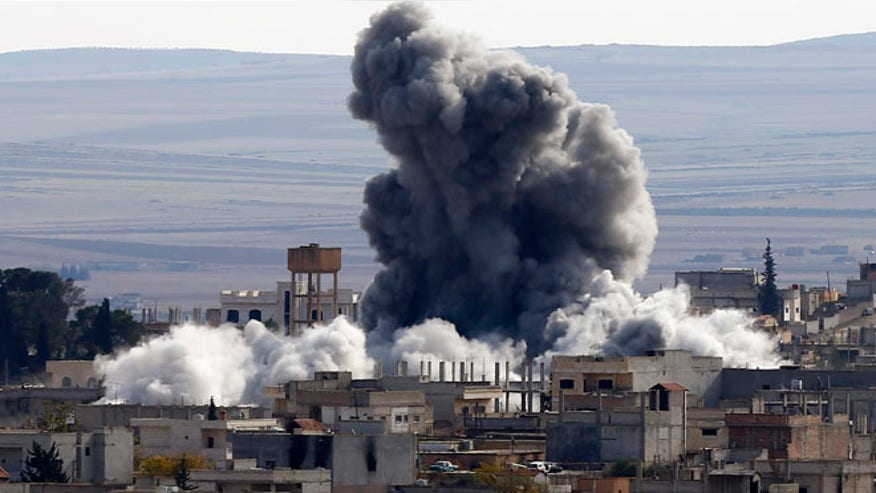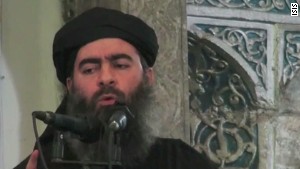
After reports this past week and a blog post by myself that stated that the United States was going to ramp up their airstrikes on terrorist group ISIS and do so by adding more aircrafts and planes, these reports were nothing but confirmed on Sunday morning as a U.S.-led coalition fighting ISIS in Syria stepped up its attacks on the militant Islamist group's de facto capital by launching 30 airstrikes targeting Raqqa overnight. At least 10 of the airstrikes were carried out by government war planes, attacking the Raqqa city- the de facto capital of ISIS-which is known as a hotspot for ISIS training centers, weapons depots and accommodations for fighters. It is not stated or known how many were killed and the level of damage these airstrikes ultimately caused. Clearly, the US is just about all-in with their pursuit of destroying ISIS and their leaders and it will be interesting to see how these next few weeks will unfold with their emphasis on airstrikes and more ISIS surveilance.
Questions:
Do you think that theses airstrikes will be beneficial for the US?
What does the quick timing of the United States actions with their air strikes say about how committed they are to stopping ISIS?
How much is too much? Does the US need to continue dropping down bombs and airstrikes on heavily populated ISIS grounds to accomplish their goal?
To read more:

5 comments:
I think that a lot of reporters and commentators and even politicians themselves have talked about us being in a sort of war-state with ISIS and banking on the idea that there are no innocent people in war. So while some bombing on the ISIS capitol may be beneficially from a military standpoint, at a certain point the US has to think about the innocent people being killed in the process. The killing of civilians has been a very big issue in terms of US involvement in the Middle East for the past 15 years. ISIS is of course a very prevalent threat and I am not suggesting that the US do nothing but these are innocent people's lives that are being taken because they can't escape the same people that the US is trying to take down. That doesn't seem fair to me, but war never is.
I agree with Kelsey; I feel as if the U.S.'s immediate decision to increase airstrikes on ISIS is not necessarily the best or most beneficial choice at the moment. As seen throughout history, bombing heavily populated areas is never the greatest ethical choice, even if it means taking away from ISIS' de facto capital of training supplies and weapons home base, as the costs greatly outweigh the possible benefits. In this case, it is estimated that the United States effort will cost around $143 million per airstrike, a hefty cost that we shouldn’t be shelling out right now for involvement in Syria. The U.S.' emphasis on airstrikes and greater ISIS surveillance show their immense commitment to stopping ISIS from causing further harm; although I see the imminent danger that ISIS has caused and continues to dispel on civilians, I feel as if the U.S. is getting itself too involved as a "global police" through its deliberate airstrikes, when this is also entirely a worldwide issue. The U.S. shouldn't have to prove itself through continuous airstrikes in order to accomplish some sort of negotiation with ISIS. In fact, I feel as if these airstrikes will only provoke further expansion of ISIS' violence and possibly mean a redeployment of U.S. troops if the violence continues to increase. With this in mind, I think involvement with ISIS is not worth the possible start of another war for the U.S.
I completely agree with the last two post and would like to add on that it seems that these air strike are just a false facade that the US are taking action to stop ISIS when in reality we have no clear plan in how to take down this terrorist organization, and by doing so we are just giving ISIS more of an excuse to retaliate against the US.
However, Playing devils advocate, could the US have afforded to not airstrike ISIS, It seems that the US has place it self as the global police and now that we are here we are cursed to it, and the fact that if we do not take direct visual action against the group it would only ruin our image as being strong against terrorist and possibly ruining whatever ties we have with countries in the middle east by making it seem that we are abandoning them.
The people above have stated many arguments that point out that the United States may not have necessarily made the right choice by bombing the city more heavily than we have been in the pase few weeks and while I certainly agree with that opinion, I'd also like to propose the thought that maybe David is right in that some of the action was in fact for our citizens and looking prepared to deal with terrorist action and not just military strategy based. Additionally, if we did indeed it the targets we intended, this may buy the US some time to really formulate a plan so tactics such as this will not need to be used in the future.
As much as I'd hate to see another ISIS beheading or something on that level, I still can't see how bombing heavily populated areas (and therefore inflicting some innocent causalities through the process) is the best scenario for everyone in the long run. While the U.S. government may be able to target some ISIS leaders and military supplies, what they can't do is kill the ideas that those people have. In fact, drone strikes and bombing in the region probably increases the anti-american sentiment in the region, and this terrible cycle repeats itself. I wish there was a simple suggestion to end this mess, but the damage that has already occurred makes that very difficult. For now, I think the best course of action is to ease up on the drone strikes, let the anti-american sentiment simmer down a bit, then decide where to go from there. Again, doesn't seem like there's a simple solution to this situation.
Post a Comment